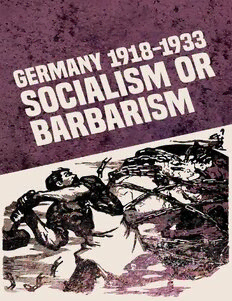
germany 1918-1933: socialism or barbarism PDF
Preview germany 1918-1933: socialism or barbarism
Germany 1918-1933: Socialism or Barbarism Rob Sewell First edition Wellred Books, 2018 Copyright © Wellred Books All rights reserved UK distribution : Wellred Books, wellredbooks.net PO Box 50525 London E14 6WG [email protected] USA distribution : Marxist Books, Marxistbooks.com WR Books 250 44th Street #208 Brooklyn New York NY 11232 [email protected] Cover design by Benjamin Curry. Layout paper edition by Jack Halinski-Fitzpatrick. Ebook produced by Martin Swayne. Smashwords edition, published November 2018. All images used are from the David King Collection. Purchased from David King by Tate Archive 2016, or from the public domain. ISBN: 978 1 900 007 986 “Bourgeois society stands at the crossroads, either as a transition to Socialism or regression into Barbarism.” (Rosa Luxemburg, �e Junius Pamphlet, 1916.) Table of Contents Preface Introduction Opening Drama News From Germany Dual Power Emperor With No Clothes �e Armistice Workers Held Power Barbarism Learn From History Chapter One: �e Rise of German Social Democracy Growth of German Capitalism Marx and Engels Engels Distorted Revisionism International Response Karl Kautsky Di�erences With Lenin Lenin and Kautsky Break With Kautsky Millerandism �e General Strike Anti-War Feelings �e Great Betrayal Epoch of Imperialism All Eyes on German SPD Stunning Blow Zimmerwald Lenin at Zimmerwald �e Spartacists Internationale Group Growing Opposition Junius Pamphlet Birth of USPD February Revolution Strike Wave �e Russian Revolution Brest-Litovsk Luxemburg and the Russian Revolution Chapter Two: In the throes of Revolution Prince Von Baden Talk of Insurrection Mutiny Spreads Revolution Spreads Workers’ and Soldiers’ Councils Hate It Like Sin Ebert Becomes Chancellor Long Live the Republic! Traditional Parties ‘�eir Government’ People’s Commissars New Breed Ebert and the Generals What Kind of Democracy? �e Problem of the National Assembly Renegade Kautsky National Congress of Councils Tactical Mistake Socialisation Left-Wing Communism Counter-Revolution Raises Its Head Peoples’ Naval Division Witch-Hunt Begins Communist Party Founded Rebellious Youth New Born Chapter �ree: Counter-Revolution Raises its Head �e Spartacist Uprising Dismissal of Eichhorn Traitors to the Proletariat Deliberations ‘Dogs of War’ How Could You? Luxemburg, Liebknecht Murdered Friedrichsfelde Luxemburg’s ‘Error’ National Assembly Election Freikorps Intervene ‘Schiessbefehl’ Works Councils Bavarian Soviet Republic Chapter Four: �e Kapp Putsch March 1920 Two Counter-Revolutionary Wings Learning the Lessons �e Split Political Polarisation Building the Comintern �e Halle Conference School of Communism New VKPD Leadership �eory of the O�ensive Unmitigated Disaster Ecci Supports German ‘Lefts’ Lenin on Germany Lines Drawn �ird Comintern Congress �e United Front Tactic �e Case of Paul Levi Battle Lines Drawn Chapter Five: �e Spoils of War Squeeze until the Pips Squeak Carthaginian Peace French Occupation of the Ruhr Hyperin�ation Revolutionary Situation Looking the Wrong Way Anti-Fascist Day Preparing the Insurrection October Days Hamburg Uprising Hitler’s Beer Hall Putsch �e Aftermath of 1923 Defeat Lessons of October Chapter Six: �e Interregnum Struggle Sharpens Socialism in One Country Stabilisation Eight-Hour Day Abolished Economic Revival Soviet-German Relations Uprising Still Remains on the Agenda Fifth World Congress Removal of Fischer-Maslow 1925 Presidential Election Open Letter �e 1928 General Election Young Plan �e �ird Period May Day 1929 �e 1929 Crash Brüning Government Chapter Seven: Fascism’s Rise to Power Big Business Turns to Hitler �e Fascist Henry Ford Reichstag Election in September 1930 Neurosis of the Petty Bourgeoisie Stalinism and Fascism Violence Spreads �e ‘Red’ Referendum Berlin Transport Strike Critical Situation Hindenburg Returned July 1932 Election November 1932 Election Repression and Bonapartism Hitler Becomes Chancellor ‘Legal Means’ �e Reichstag Fire March 1933 Election Chapter Eight: �e Nazi Terror No Resistance May Day Appeal Destroying the Unions SPD Banned �e Stalinist Response De�ance Night of the Long Knives Stalin and Hitler ‘Left’ Historians Austrian Uprising Underground Resistance Situation Reassessed Reform or New Party? Germany Prepares for War Second World War General’s Plot Fourth International Future Prospects Appendix One: Hitler’s British Connections January Club Royal Family Appendix Two: �e Case of Béla Kun Glossary Bibliography Preface �ere was once a nanny-goat who said, In my cradle someone sang to me: “A strong man is coming. He will set you free!” �e ox looked at her askance. �en turning to the pig He said: “�at will be the butcher.” Bertolt Brecht Behind Bertolt Brecht’s humour is always a serious point. �e words are a swipe at the fascist propaganda, which attempted to reassure the middle classes while their throats were being cut. Brecht is not interested in lulling people to sleep, but wishes to awaken them. �e task of this book is also to awaken an interest – in the German Revolution and its aftermath – and provide an understanding of what went on. Old Hegel, the great German philosopher, once commented that the only thing you learn from history is that people do not learn from history. �is could be the reason why history tends to repeat itself, �rst as a tragedy, then as a farce, to quote Marx. But our task is precisely to learn from history. Bourgeois historians say there are no laws governing history. But that is not the case. �ere is causality in history, and it is our task to uncover its laws. Marx and Engels explained that societies, as with nature, evolve according to material laws, meaning that societies are not eternal, but arise, develop, and enter into crisis. Our fate is not determined. Men and women make history, but under conditions not of their own choosing. It is through experience that they learn and begin to take destiny into their own hands. History deals with real relationships, rather than simply the high-sounding dramas of princes and states. And Marxism allows us to get our bearings, to navigate our way and make sense of the labyrinth of events. As Marx explained, “philosophers have only interpreted the world in various ways. �e point, however, is to change it.” (K. Marx, �eses on Feuerbach.) �e
